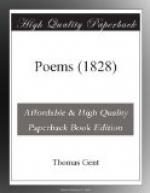MATURE REFLECTIONS.
O Love! divinest dream of youth,
Thy day of ecstacy is o’er,
My bosom, touch’d by time and truth,
Thrills at thy dear deceits no more.
Nor thou, Ambition! e’er again,
With splendour dazzling to betray,
And aspirations fierce and vain,
Shall tempt my steps—away!
away!
Alas! by stern Experience cleft,
When life’s romance is turn’d
to sport;
If man hath consolation left
On this side death—’tis
good old port.
And thou, Advice! who glum and chill,
Do’st the third bottle still
gainsay;
Smile, and partake it, if you will,
But if you wont—away! away!
THE GRAVE OF DIBDIN.
Lives there who, with unhallow’d hand, would
tear,
One leaf from that immortal wreath which shades
The Hero’s living brow, or decks his urn?
Breathes there who does not triumph in the thought
That “Nelson’s language is his mother
tongue,”
And that St. Vincent’s country is his own?
Oh! these bright guerdons of renown are won
By means most palpable to sense and sight;
By days of peril and by nights of toil;
By Valour’s long probation, closed at last
In Victory’s arms—consummated and
seal’d
In deathless Glory and immortal Fame.
Musing I stand upon his lowly grave,
Who, though he fought no battle—though
he pour’d
No hostile thunders on his country’s foes,
Achieved for Britain triumphs, less array’d
“In pomp and circumstance,” nor visible
To vulgar gaze—the triumphs of the Mind.
He nursed the elements of courage—he
Supplied the aliment that feeds and guides
The daring spirit to its high emprise—
A nation’s moral energies, by him
Directed, found a nobler end and aim.
He gave that high discriminating tone
That marks the Brave from mercenary tools—
Features that separate a British Crew
From hireling bravoes, and from pirate hordes.
And yet no marble marks the spot where lies
The dust of DIBDIN;—no inscription speaks
A Nation’s gratitude—a Bard’s
desert.
The youthful Sailor on his midnight watch,
Fixing his gaze upon the tranquil moon,
Felt his heart soften as the thoughts of home
Rush’d on his faithful memory;—then
it was
In language meet, and in appropriate strains—
Strains which thy lyre had taught him—he
pour’d forth
The feelings of his soul, and all was calm.
Thy Spirit still presides in that carouse,
When to “the Far away” the toast is given,
And “absent Wives and Sweethearts” claim
their right,
With Woman’s constancy thy songs are rife;
And this pure creed still teaches Man t’ endure
Privations, danger, and each form of death.
When not a breath responded to the call,
And Seamen whistled to the winds in vain;
When the loose canvass droop’d in lazy folds,
And idle pennants dangled from the mast;—
There, in that trying moment, thou wert found
To teach the hardest lesson man can learn—
Passive endurance—and the breeze has sprung,
As if obedient to the voice of Song:—
And yet unhonour’d here thy ashes lie!




